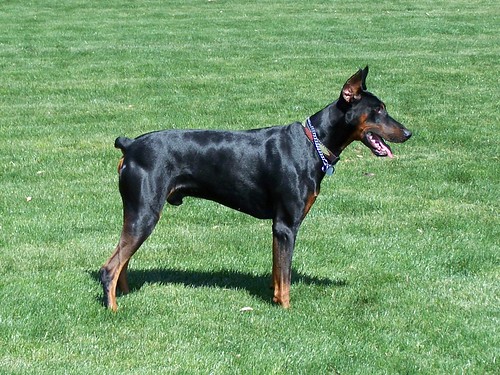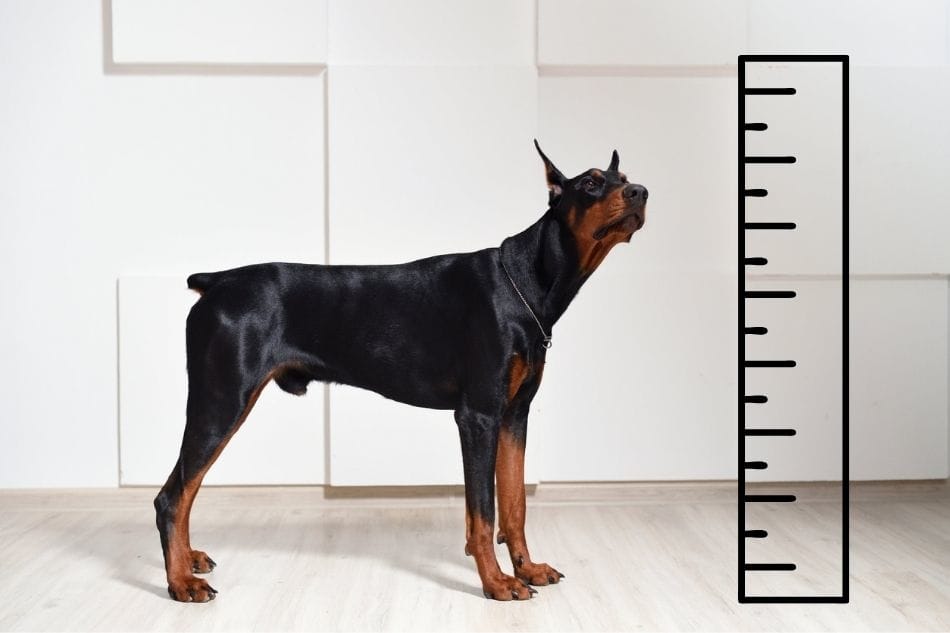Is your Doberman not growing as you expected? It can be concerning to see your beloved pet not reaching its full potential. Dogs, just like humans, have specific growth patterns and factors that can influence their growth. So, why is your Doberman not growing?
Lack of proper nutrition and genetics can play a crucial role in the growth of a Doberman. A balanced diet with appropriate proportions of proteins, fats, and carbohydrates is essential for their development. Additionally, certain genetic factors can affect their growth rate and overall size.
If your Doberman is not growing, there could be several reasons for this. It’s important to ensure that they are getting a well-balanced diet with proper nutrition. Additionally, genetics and health issues can play a role in growth. Regular veterinary check-ups can help identify any underlying health issues that may be affecting your Doberman’s growth. Finally, it’s important to provide plenty of exercise and mental stimulation to promote overall health and development. Consult with a veterinarian for personalized guidance.

Why is my Doberman not growing?
Dobermans are known for their athletic build and strong stature. So, if your Doberman is not growing as you expected, it can be a cause for concern. But why is your Doberman not growing? In this article, we will explore the potential reasons behind this issue and discuss what you can do to help your Doberman achieve healthy growth.
1. Genetics
Genetics play a crucial role in a dog’s growth and development. Just like humans, dogs have a predetermined genetic potential for their size. If your Doberman comes from a line of smaller-sized Dobermans, it may naturally have a smaller stature compared to other Dobermans.
Additionally, if your Doberman is a mixed breed, it may inherit certain traits from the other breed that affects its growth. It’s essential to remember that not all Dobermans will grow to be the same size, and individual variations are normal.
If you’re concerned about your Doberman’s growth, consult with a veterinarian. They can assess your dog’s genetic background and offer guidance on what to expect in terms of growth and development.
2. Nutrition
Nutrition plays a crucial role in a dog’s growth and development. If your Doberman is not receiving the right nutrients, it can hinder its growth. Ensure that you are feeding your Doberman a balanced diet that meets its nutritional needs.
Protein is especially important for muscle development, which is crucial for your Doberman’s growth. Make sure that your dog’s food contains a sufficient amount of high-quality protein. Consult with a veterinarian to determine the right diet for your Doberman’s specific needs.
Additionally, be cautious about overfeeding your Doberman. While you want to ensure it gets enough nutrients, excessive weight gain can lead to health issues and may hinder proper growth. Feed your Doberman according to the feeding guidelines provided by your veterinarian or dog food manufacturer.
3. Health Conditions
Underlying health conditions can also impact the growth of your Doberman. If your dog is not growing as expected, it’s essential to rule out any underlying health issues. Some health conditions that can affect growth include:
- Hormonal imbalances
- Nutritional deficiencies
- Gastrointestinal problems
- Parasites
- Thyroid issues
- Genetic disorders
If you suspect that your Doberman’s growth is being affected by a health condition, consult with a veterinarian. They can assess your dog’s health and conduct any necessary tests to determine the underlying cause. Treating the underlying condition can often help your Doberman regain healthy growth.
4. Exercise and Physical Activity
Exercise and physical activity are vital for a dog’s overall growth and development. Proper exercise helps in developing strong muscles, maintaining a healthy weight, and promoting bone density. Lack of exercise or inadequate physical activity can impact your Doberman’s growth.
Ensure that your Doberman gets regular exercise appropriate for its age and breed. Daily walks, playtime, and interactive activities can help stimulate your Doberman physically and mentally. However, it’s important to note that excessive or strenuous exercise in young Dobermans can be detrimental to their growth plates. Consult with a veterinarian to ensure your Doberman gets the right amount and type of exercise.
5. Age and Growth Phases
Different stages of a Doberman’s life come with different growth rates. Like humans, puppies experience rapid growth during their early months. However, as they reach adulthood, the growth rate slows down. It’s essential to be aware of the expected growth patterns for Dobermans based on their age.
During the growth phase, provide your Doberman with appropriate care, nutrition, and regular veterinary check-ups. This way, you can ensure that your dog is growing as expected and address any concerns in a timely manner.
How to Help Your Doberman Grow
If you’re concerned about your Doberman’s growth, here are a few steps you can take to support its healthy development:
- Consult with a veterinarian to assess your Doberman’s overall health and determine if there are any underlying issues affecting growth.
- Ensure that your Doberman is receiving a balanced diet with the right nutrients, particularly protein, to support muscle development.
- Monitor your Doberman’s weight to prevent excessive weight gain, which can hinder growth.
- Provide regular exercise and physical activity appropriate for your Doberman’s age and breed.
- Follow the recommended vaccination and deworming schedule to prevent health issues that can affect growth.
- Be patient and understand that individual variations in growth are normal. Your Doberman may not reach the same size as others of its breed.
Conclusion
If your Doberman is not growing as you expected, it’s essential to assess the potential reasons behind it. Genetic factors, nutrition, health conditions, exercise, and age can all play a role in your Doberman’s growth. By consulting with a veterinarian, providing proper care, and addressing any underlying issues, you can help your Doberman achieve healthy growth and development.
Key Takeaways: Why is my Doberman not growing?
- A balanced diet is crucial for the proper growth and development of your Doberman. Ensure they are getting the right nutrients in their diet.
- Genetics play a significant role in determining the size of your Doberman. Some Dobermans may naturally be smaller in size.
- Health issues such as thyroid problems or malnutrition can affect their growth. Regular check-ups with a veterinarian are essential.
- A lack of exercise and physical activity can hinder your Doberman’s growth. Engage them in regular exercise to promote healthy growth.
- Stress and anxiety can also impact a Doberman’s growth. Create a calm and supportive environment to ensure their well-being.
Frequently Asked Questions
In this section, we address some frequently asked questions regarding why a Doberman may not be growing as expected. If you’re concerned about your Doberman’s growth, read on to find answers to common queries.
1. Why is my Doberman not reaching its expected size?
There can be several reasons why your Doberman is not growing as expected. One possibility is that your Doberman is still within the growth range for its breed and age, and it may continue to grow in the coming months. Another reason could be genetics, as some Dobermans may have slower growth rates or smaller sizes due to their genetic background. Additionally, inadequate nutrition or health issues can also affect a Doberman’s growth.
To ensure your Doberman is receiving proper nutrition, consult with a veterinarian or a canine nutritionist. They can recommend a well-balanced diet suitable for your dog’s age and breed. Regular check-ups with a veterinarian can also help identify any underlying health issues that may be hindering your Doberman’s growth.
2. How can I tell if my Doberman is not growing properly?
If you suspect that your Doberman is not growing properly, there are a few signs to look out for. Firstly, compare your dog’s current size and weight to the average size and weight range for its age and breed. If your Doberman falls significantly below the average, it may indicate growth issues.
Additionally, observe your Doberman’s overall appearance. If it appears undernourished or if its coat lacks luster, it could be a sign of inadequate nutrition. Regularly assess your dog’s health by monitoring its energy levels, appetite, and overall well-being. If you notice any concerning changes or if you have doubts about its growth, it’s advisable to consult a veterinarian for a thorough examination.
3. What can I do to support my Doberman’s growth?
To support your Doberman’s growth, start by providing a well-balanced and nutritious diet. Choose a high-quality dog food specifically formulated for large breed puppies to ensure it receives the necessary nutrients. It’s crucial to consult with a veterinarian or a canine nutritionist to determine the appropriate portion sizes and feeding frequency for your Doberman.
In addition to proper nutrition, regular exercise is essential for your Doberman’s growth and development. Engage in structured play sessions and provide opportunities for physical activity to promote muscle growth and overall fitness. However, avoid excessive exercise that can strain developing joints and bones.
4. Can health issues affect my Doberman’s growth?
Yes, health issues can potentially impact your Doberman’s growth. Certain medical conditions, such as hormonal imbalances, malabsorption disorders, or intestinal parasites, can interfere with your dog’s ability to absorb essential nutrients, leading to stunted growth.
If you suspect that health issues are affecting your Doberman’s growth, consult with a veterinarian. They can conduct necessary tests and examinations to identify any underlying health conditions that may need treatment.
5. When should I be concerned about my Doberman’s growth?
If your Doberman is significantly below the average size for its age and breed, or if it shows signs of malnutrition, lack of appetite, or overall poor health, it’s advisable to be concerned and seek veterinary advice. It’s always better to address any growth concerns earlier rather than later to ensure your Doberman’s healthy development.
Regular check-ups with a veterinarian can help monitor your Doberman’s growth progress and address any concerns promptly. Remember, every dog is unique, and growth rates may vary, but it’s important to ensure your Doberman is on a healthy growth trajectory.

If you’re wondering why your Doberman is not growing, there are a few possible reasons. One is that your dog may still be within the normal growth period, which can continue up to 18 months of age. Another reason could be genetics, as some Dobermans may naturally reach their adult size earlier or later than others.
Diet can also play a role in your Doberman’s growth. Ensure that you are providing a balanced and nutritious diet that supports healthy growth. Additionally, factors such as exercise, overall health, and any underlying medical conditions could influence your dog’s growth rate. If you have concerns about your Doberman’s growth, it’s best to consult with a veterinarian for a thorough evaluation.
